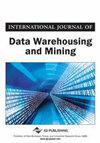An Improvement of K-Medoids Clustering Algorithm Based on Fixed Point Iteration
IF 0.7
4区 计算机科学
Q4 COMPUTER SCIENCE, SOFTWARE ENGINEERING
International Journal of Data Warehousing and Mining
Pub Date : 2020-10-01
DOI:10.4018/ijdwm.2020100105
引用次数: 3
Abstract
The process of K-medoids algorithm is that it first selects data randomly as initial centers to form initial clusters. Then, based on PAM (partitioning around medoids) algorithm, centers will be sequential replaced by all the remaining data to find a result has the best inherent convergence. Since PAM algorithm is an iterative ergodic strategy, when the data size or the number of clusters are huge, its expensive computational overhead will hinder its feasibility. The authors use the fixed-point iteration to search the optimal clustering centers and build a FPK-medoids (fixed point-based K-medoids) algorithm. By constructing fixed point equations for each cluster, the problem of searching optimal centers is converted into the solving of equation set in parallel. The experiment is carried on six standard datasets, and the result shows that the clustering efficiency of proposed algorithm is significantly improved compared with the conventional algorithm. In addition, the clustering quality will be markedly enhanced in handling problems with large-scale datasets or a large number of clusters.基于不动点迭代的K-Medoids聚类算法改进
K-medoids算法的过程是首先随机选择数据作为初始中心,形成初始聚类。然后,基于PAM (partitioning around medioids)算法,将中心依次替换为所有剩余数据,以寻找具有最佳固有收敛性的结果。由于PAM算法是一种迭代遍历策略,当数据大小或集群数量较大时,其昂贵的计算开销将阻碍其可行性。利用不动点迭代法搜索最优聚类中心,建立了基于不动点的K-medoids算法。通过构造每个聚类的不动点方程,将寻找最优中心的问题转化为求解并行方程组的问题。在6个标准数据集上进行了实验,结果表明,与传统算法相比,本文算法的聚类效率有显著提高。此外,在处理大规模数据集或大量聚类问题时,聚类质量将显著提高。
本文章由计算机程序翻译,如有差异,请以英文原文为准。
求助全文
约1分钟内获得全文
求助全文
来源期刊

International Journal of Data Warehousing and Mining
COMPUTER SCIENCE, SOFTWARE ENGINEERING-
CiteScore
2.40
自引率
0.00%
发文量
20
审稿时长
>12 weeks
期刊介绍:
The International Journal of Data Warehousing and Mining (IJDWM) disseminates the latest international research findings in the areas of data management and analyzation. IJDWM provides a forum for state-of-the-art developments and research, as well as current innovative activities focusing on the integration between the fields of data warehousing and data mining. Emphasizing applicability to real world problems, this journal meets the needs of both academic researchers and practicing IT professionals.The journal is devoted to the publications of high quality papers on theoretical developments and practical applications in data warehousing and data mining. Original research papers, state-of-the-art reviews, and technical notes are invited for publications. The journal accepts paper submission of any work relevant to data warehousing and data mining. Special attention will be given to papers focusing on mining of data from data warehouses; integration of databases, data warehousing, and data mining; and holistic approaches to mining and archiving
 求助内容:
求助内容: 应助结果提醒方式:
应助结果提醒方式:


